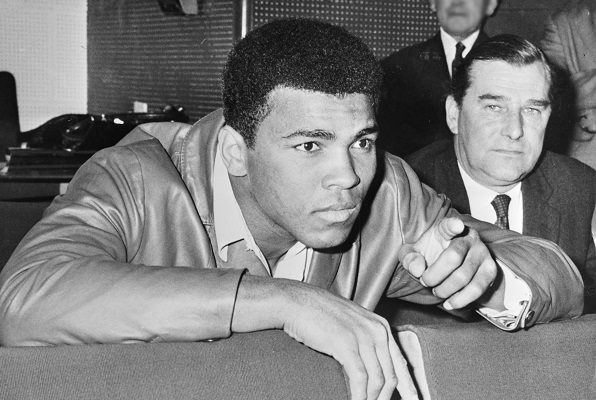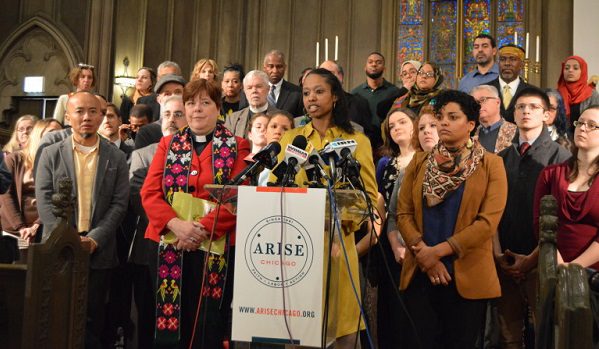
Editor’s Note: The following is a guest post submitted to me by my friend, Maha Elgenaidi, the CEO of Islamic Network Groups. It is the repost of a sermon given by Pastor Rebecca Irelan in support of Wheaton College Prof. Larycia Hawkins and about what Christians can learn from the Muslim view of the Prophet Jesus.
In this time of rampant Islamophobia and fear-mongering, ING has launched an initiative entitled Interfaith Allies: Know your Muslim Neighbor. In line with the national “Know your Neighbor” project, initiated last month at the White House, this initiative seeks to bring Muslims and Americans of other faiths together for fellowship, education, and dialogue, in the understanding that face-to-face encounter is the best antidote to fear and prejudice. In particular, ING aims to encourage non-Muslim communities and organizations to invite Muslim participation in their events. One of the first such events took place this past Sunday at Willow Glen United Methodist Church in San Jose, where ING, with Pastor Rebecca Irelan’s enthusiastic support, invited the Muslim community to attend the services at which the following sermon was preached. Pastor Irelan intended this sermon, dealing with what Christians can learn from the Muslim view of Jesus, to be an opening for conversation between Muslims and Christians and to encourage serious theological dialogue between the two traditions conducted not just by academics and clergy but by ordinary adherents of both faiths. We present her sermon here to expand and further that dialogue.
Maha Elgenaidi
**********
Jesus for Muslims – a sermon by Rev. Dr Rebecca Irelan; Text: Luke 7:11-23
Larycia Hawkins is an associate professor of political science at Wheaton College. Or at least, she was. She is in the process of being fired for a comment she made on Facebook. During Advent, she had been wearing a hijab to class. In an online post, she explained that she wanted to stand with her Muslim sisters in this country because, like Christians, they are “people of the book” and because we believe in the same God.
Evidently, that was a radical thing to say at Wheaton College, which is an Evangelical Christian school. After receiving complaints and conducting an investigation, the administration began the firing process. By simply saying that Christians and Muslims worship the same God, Professor Hawkins had violated the school’s statement of beliefs.
Today I stand with Professor Hawkins and the many students supporting her because I want others to know that many Christians in this country agree with her. Jews, Christians, Muslims — we are all children of Abraham, and we worship the God of Abraham. Of course, we have different ways to understand God and different ways of speaking about God, but I am convinced that those differences bother us a lot more than they bother God. Do you want to know know what bothers God? How we have failed to love one another. So it is high time that we get to know our Muslim neighbors.
We will take a very small step this morning. To speak of God with anyone, Christians start with Jesus, because for Christians, Jesus is the way to God. But even Christians don’t all agree on what that means. We are in the season of Epiphany. As I’ve said, the word means “manifestation.” This is the season that we celebrate the manifestation, or revelation, of Christ to the world.
And so last week, I preached the first of a series of sermons on what Christ means in other faiths in our world. I began with the hope, the hypothesis, that learning how people of other faiths see Jesus can teach us something we didn’t know about him or something that we are prone to neglect or forget. In this series, I want to convince you that Christians don’t hold a monopoly on Jesus. Christ is bigger than any book or doctrine, any creed or custom. Christ is bigger than Christianity; the truth of Jesus can’t be contained by or exhausted by any one religion.
Last week, we saw Jesus through the eyes of our elder brothers and sisters, the Jews. We saw the historical Jesus as thoroughly Jewish and a staunch defender of the Law, the Command of God, and we remembered how important holy living is to Jesus and to God. This week, we will attempt to see Jesus through the eyes of our younger brothers and sisters, the Muslims. What can we learn from what they know about Jesus? How can our own faith deepen by learning about theirs?
I confess that I cannot fully answer those questions because I am no expert on what Jesus means for Muslims. But I can make a stab at them and offer a few suggestions for further dialogue.
To the surprise of most Christians, Muslims feel a special closeness to Jesus. For one thing, Jesus and Muhammad stand together because, in Islam, there was no prophet that stands between them. And Jesus is mentioned 93 times in the Quran, more than Abraham. His mother Mary even has a book named after her, the only woman so honored in the Quran.
But that isn’t all. There are literally hundreds of stories and sayings of Jesus recorded in Muslim literature outside of the Quran. These references date from the eighth to the eighteenth centuries. Some have clear connections to our Gospels. Others have parallels with other early Christian works that didn’t make it into the New Testament. And still others are completely original. Why this continuing interest in Jesus?
For one thing, we have to remember that when Islam was first spreading throughout the Middle East, it spread into places that were already Christian. At that time, Egypt was overwhelmingly Christian. So were Syria and Iraq. In fact, what one scholar calls the “Muslim Gospel,” arose in the Iraqi city of Kufa.[1] So as Christians in these countries gradually converted to Islam over time, they naturally brought their interest in Jesus with them.

But the Jesus we see in this “Muslim Gospel” doesn’t seem to be the same Jesus we met in Sunday School. That’s no surprise, because the Christianity that was practiced in the eastern part of the Roman Empire was and still is noticeably different from the Christianity practiced in the western parts. The Jesus in the Eastern Church is by and large more ascetic, more other-worldly, and more mystical than the Jesus in the West, and I think that you’ll find that the Jesus in Islam is, too.
Not only that, but Christians all over the ancient world argued about who Jesus was in relationship to God. There were many different sects and schools of thought. Was Jesus human? Was he divine? Was he both or something in between? For centuries, there were charges and counter-charges of heresy and blasphemy. So into a very diverse and sometimes divisive Christianity came Islam with its own ideas about Jesus.
In Islam, Jesus is held in high esteem. You will find many different titles for him in the Qur’an and in other writings. His Arabic name is Isa and he is most often referred to as Ibn Maryam, Son of Mary, because Muslims, too, believe that he was born of a virgin. He is also called “Messiah,” though this title corresponds more to the Jewish understanding of the term than our Christian one. Other titles for him include “Servant of God,” “Word of God,” and “Spirit of God.” But whatever title is used, when Muslims speak the name of Jesus, they follow it with the phrase, “peace be upon him.”
While it is true that Muslims deny that Jesus is the Son of God, they would have no problem with the Jesus we meet in the Gospel reading this morning. In fact, the raising of the widow’s son in Nain is one of the stories about Jesus that we also find in the Qur’an. In Luke, we read that when Jesus raised her son from the dead, the people glorified God, saying, “A great prophet has arisen among us!” [Luke 7:16] And Muslims would agree. In Islam, Jesus is revered as a great prophet, like Abraham, Moses and Muhammad. In fact, belief in his prophetic mission is required of Muslims.
They also believe that Jesus performed many miracles and that he was God’s righteous messenger to the Jews. In our text today, John the Baptist wants to know if Jesus is the Messiah. I think that a faithful Muslim would answer, yes, because — as the Gospel says — Jesus came and the blind received their sight, the lame walked, the lepers were cleansed, the deaf were made to hear, the dead were raised, and the poor had good news brought to them. [Luke 7:22] The story concludes with Jesus saying, “And blessed is anyone who takes no offense at me.” [7:23] In that case, Muslims must be blessed because they take no offense at Jesus.
Islam gives Jesus a role in the final judgment, too. Muslims do not believe that Jesus was killed on the cross — for they assert that God would not let his prophet be defeated in that way — but they do believe that he was raised up to heaven as Elijah was. And one day, he will return to earth to defeat the false Messiah, the anti-Christ, to announce the Day of Judgment and reign over all people in justice and in peace. After forty years — in other words, after completing his lifespan — he will die a natural death and be buried in the city of Medina, next to Muhammad. As I understand it, that is the traditional teaching about Jesus in Islam.
Now, without the emphasis on the cross that you find in Christianity, Islam focuses not on the martyrdom but the message of Jesus. Instead of “believe in me,” the Prophet Jesus says, “Heed me.” He says, “I am bringing you the Word of God. It is a word of justice and of mercy, a word of compassion and of peace. Listen to it. Align your life to it. Don’t let any other god or thing get in the way of it. Don’t let anyone or anything take priority over it. Don’t let society corrupt it. Don’t let the powerful abuse it. Make sure the poor receive it. And make sure the weak can hold onto it. Finally, make sure that you never forget it.
Sometimes Christians are so focused on Jesus’ death and disagreeing with each other about what that means for us that we forget about his life and what his message means for us. Muslims remind us that there is a lesson to be learned from his life, not just his death. There is a wealth to be gained from his words, not just his wounds.
We could say that Jesus was a good Muslim because, throughout his life, he submitted himself to the will of the one God. After all, that’s what being a Muslim means. The word Muslim means “one who submits.” But he was also a good Muslim because his message to us was the message of all the prophets, though they used different words for different peoples at different times. And that common message is this: “You shall love the Lord your God with all your heart, and with all your soul, and with all your strength, and with all your mind; and your neighbor as yourself…do this and you will live. [Luke 10:27-28][2]
There is so much more we could say about Jesus in Islam. I’d love to read to you some of the sayings of Jesus found in Muslim literature that you’ve never heard before, but there isn’t time. So as we close, I’d like to bring us back to the Christian proclamation I began with: Jesus is the way to God.
The verse from the Gospel of John goes like this: “Jesus said to [Thomas], ‘I am the way and the truth and the life. No one comes to the Father except through me.'” [John 14:6] This passage has long been used by Christians to declare that anyone who does not believe what we believe about Jesus will not be saved. Instead of “do this and you will live,” we have often said, “believe this or you will die.”
But I want to invite you to think about this passage in a different way today. What does it really mean to say that Jesus is the way to God? According to the dictionary, way can mean a “road” or “path,” an “opening” or “opportunity.” It can also mean a “course of conduct or action,” a “manner or method of doing something.” [American Heritage Dictionary]
Traditionally, Christians have thought that believing certain things about Jesus was the way to God, that having the right beliefs was taking the right path to God. But it could also mean that by Jesus’ conduct or action, by his manner or method of doing something, he shows us the way to God. At least that’s what I think of when he tells his disciples, “Follow me.” In his life and by his love, Jesus is showing us the way.
In that sense, I will dare to say that Jesus is the way not only for Christians, but for Jews and Muslims as well, though not in quite the same way. As we saw last week, for Jews, the way to God is through obedience to God’s Law. And Jesus, in the Sermon on the Mount, showed them the way. In his conduct and in his manner and method of teaching, he embodied the Law and showed them how to abide not only by the letter but also by the spirit of it. He showed them how to write the Law on their hearts and not just wear it on their sleeves, as did some of the religious elite. Jesus showed them that the way to God is a way of Law and that that Law is the way of love.
Now for Muslims, the way to God is through submitting to the will of God. Again Jesus, in his ministry among the people, put flesh on what submission to God looks like. Anointed by God, Jesus went where God wanted him to go and said what God wanted him to say. He brought good news to the poor, proclaimed release to the captives and recovery of sight to the blind. He let the oppressed go free and announced the coming of God’s kingdom. [Luke 4:18-19]
Messiah Jesus healed the sick, fed the hungry, and confronted injustice. He spoke the truth to power even when by doing so he endangered his own life. He turned the other cheek, he went the second mile, he loved his enemies, he gave to all who begged from him, and he prayed for those who persecuted him. [Matthew 5:39-44] In all things, he did the will of God who sent him. So for Muslims, too, he shows the way to God.
I believe that for all of us, Jesus is the way, the truth and the life. But even if we could all agree on that statement, it would by no means erase the significant differences between the Jesus of Christianity and the Jesus of Islam. Nevertheless, it might give us a more constructive place to begin to talk and to listen to one another about our differences, to grow in mutual understanding, to clarify what we believe as we learn what others believe. There is no better way to deepen our own faith than to have to explain it and practice it for someone else. And that would please the Prophet Muhammad and Jesus the Christ, peace be upon them both. Amen.
[1] Tarif Khalidi, The Muslim Jesus: Sayings and Stories in Islamic Literature (Cambridge: Harvard University Press, 2001), 30.
[2] “A Common Word Between Us and You” is the name of a document signed by Muslim scholars and leaders that argues for the principles that Christians and Muslims hold in common: the love of God and neighbor. You can view the document and the Christian responses to it at www.acommonword.com.
Jesus for Muslims: A Sermon Preached by Rev. Dr. Rebecca Irelan to Willow Glen United Methodist Church, San Jose, CA on January 17, 2016











